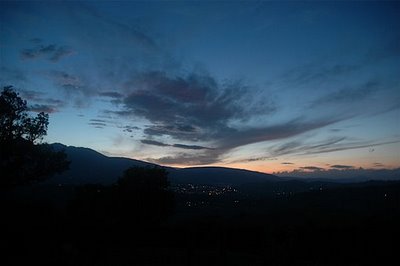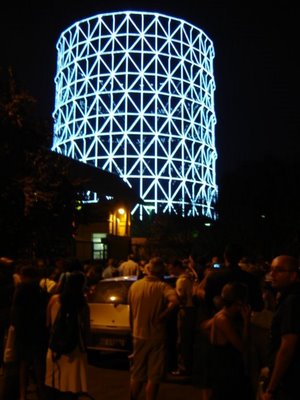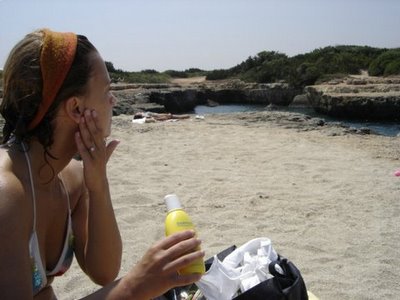Il Sette Bello is yet again on the road, this time off to Mother Russia for a few days. Yep, I'm back to the scene of the crime. This time, St. Petersburg, the land of Tolstoy and the Winter Palace.
I'll return here in a few days with a report and pix, but in the meantime, here's a small tale of my last trip to Russia. Moscow, to be exact. First, let me set the scene. It's a Saturday night in December, 2004. I am part of an international group of journalists -- French, Swiss, German, Austrians, Brits and me, plus a few Russian hosts -- out on the town. What could go wrong?
On our last night, we hit the clubs. Yep, Saturday night in Moscow. Moscow night clubs are prowled by packs of women. Women with a purpose. You have little chance to hide behind your mug of beer before one tries to pull you and your mate onto the dance floor to shake your Western ass to truly awful Russian pop covers or the obligatory local folk dance.
Happily, there was only one international incident worth mentioning to the consulate. At an upstairs bar, we watched in awe as a pack of Muscovites participated in ritual self-mutilation, taking turns consuming conflagrating concoctions, stuff that could power an old Russky tank up a hill. The first victim was forced to suck through a
straw a flaming cauldron of some rust-colored cordial. Complicating matters, they stuck her in an old Colonial-era wooden stock – the heavy wooden plank that locks your head and hands away from the rest of your body – forcing her neck to contort in reptilian fashion to suck out the alcohol. She didn't fare well.
The next vicitm, a guy, was treated more inhumanely. This monster was fitted with a construction helmet and an even heavier stock that was attached to a chain. They shackled him to the bar, presumably to keep him from fleeing at the sight of the drink they were preparing. The mixologist grabbed a beer mug and began filling it with alcohol: a double shot of gin, a double shot of what I can only assume was grain
alcohol, two different kinds of rum and topped it off with pink champagne. We all winced as he struggled to down it. Encouraging cheers turned to moments of shocked uh-ohs as he belched and wheezed his way through about 3/4 of the mug. Defeated, he took a few dizzy steps to the side while his friends rushed over to keep him from
tipping over and strangling himself with the chain.
We all agreed this must be some Soviet-era ritual that survived
perestroika. Just then, a big bear of a Muscovite tapped me on the shoulder and informed me: "You're next."
Next?
"Yes, Englander", he growled.
Realising I was a goner, I stifled my urge to correct him. What would they do to a Yank? Suspend me upside down from the ceiling and force kerosene through my nose?
I turned to a sensible fellow reporter: "How can I worm out of this?" His advice? "I'm sure they won't make you drink ALL of it. Just look at that guy," he said pointing to the young buck who'd just staggered away from his executioner. The guy was now propped up against the wall. He wore a vacant expression, like he was trying to read instructions off the underside of his eyebrows on how to regain his equilibrium.
Just then, my challenger picked me up and carried me a good 15 feet to the bar. When we landed, he gave me a simple command: "You drink, Englander!" He then made a brief speech in Russian that drew a small crowd of loud drunks. I imagined he was insulting us, calling us weenie Westerners. My mates drew the same conclusion. "Did you hear
that? He's challenging us! You have to do this, mate! For England!"
"For England? You can take your in-bred royal family and shove…" Just then, Lerch came back. "Ready, Englander?"
I tried to make a brave face, but found it harder to stifle an oncoming sob. I really didn't want to drink this thing. My heart was pounding nervously. I called over our Russian chaperone and pleaded with him to command the bar men to go easy on me. I'm old, I informed him in a cracking voice. He said something in Russian. No response. The mixologist and his toady assistant instead went into action.
I could have been imagining it, but it seemed the portions of alcohol were larger, and new and more varied bottles were being pulled off the shelf. "Dennis?" I asked my Russian guide. "Is that green stuff absinthe?" "Of course. Is Russian tradition," he informed me unhelpfully. I'd never tried the absinthe before, mainly because I have a strict policy against alcohol that was considered dangerous (something about causing blindness in some, madness in others) in the
19th century. Now, a retina-scarring dose was being emptied into my mug. The finishing touches of pink champagne turned the mug into a brimming, fizzy mess – like dropping Alka Seltzer tablets into a jar of paintbrush water.
I was beginning to hope the blindness would be sudden and painless. Particularly, when the toady produced a sawed-off beam and began banging on the bar. They fastened the construction helmet on my head and began the countdown in Russian. At one, or what I guessed was one, the toady wacked me over the head with the beam. Slightly dazed, slightly confused and incredibly angered I looked up at him, only to
catch out of the corner of my eye the mug coming at me from the other direction. To avoid the indignity of being force-fed Soviet-style, I had to wrestle the mug away. Mustering all the Yank defiance I could manage, I cocked my head up and brought the mug to my lips. I took a deep breath and muttered something resembling a vow that, should I survive this alcohol stew, I need to start acting more like an adult
for a change, which includes doing my best to avoid Russian bar challenges. How is it at the mature age of 32 that I'm about to drink a mug of jet fuel to uphold the honor and dignity (in my mind of course) of the West?

The instant the concoction touched my tongue, the yells and cat calls
went quiet. Not silent exactly, more of a muffle. For a moment there, it was just me and my mug. I'm still shaking my head about what happened next. (yes, there is photographic evidence of this. Not my proudest moment.) I'd like to think that in a different era – when this was the capital of the evil empire – my actions that Saturday night would have fit somewhere between a Hollywood treatment of
Miracle on Ice and Rocky IV. But you be the judge.
In three, dare I say, heroic glugs I inhaled the entire mug. Gone in seconds flat. I
slammed it down on the bar to a blur of stunned Muscovites and a few jubilant Westerners. I gave the crowd a victory belch and started to hoot obnoxiously about Yank supremacy wins again!!! If I was wearing my Uncle Sam boxer shorts at the time you can bet they would be doing a victory dance on the bar.
Untouched by my rant, Lerch was the first non-Westerner to greet me. I tried to reach out and give him a no-hard-feelings hug, but forgot I was still chained to the bar. Like a dog, I was yanked back into place. The Russian informed me I wasn't through. Obviously, they had underestimated me, and they needed to work on a second concoction. "No way, Boris" I told him. Lerch poked me in the chest. Justifiably,
I (or, in retrospect, the booze) poked him back. Suddenly, Dennis, a German and two Brits jumped into the dispute. Dennis started to negotiate on my behalf in Russian. The German produced a key and the Brits created a diversion. Unshackled, denuded of the construction helmet and dock, I was, for the second time in a 3-minute span being
carried, this time to safety, out of the bar by Westerners. 10 minutes later Dennis found us. He's determined to make me pay, Dennis informed me. I was feeling fine until that moment. My bravado was gone. I really didn't want to drink another concoction. He can't make me. The others nodded. Dennis wasn't so sure. Dennis told me to hide in a downstairs bar. So, I did. Nursing a pint of Guinness (why Guinness?
It seemed like the neutrality of Ireland was what I needed), I found the most inconspicuous spot in the joint – on the dance floor between a pack of Russian women who happily pulled me into a Russian folk dance (replete with an encore that probably still hasn't ended). Vegas has nothing on this town! Considered yourselves warned, comrades.




































